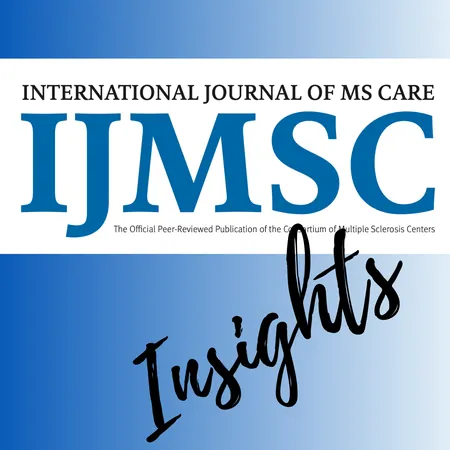
Breaking Boundaries: Dr. Blanca De Dios Perez's Groundbreaking Research on Employment and Multiple Sclerosis
2024-12-19
Author: Arjun
Breaking Boundaries: Dr. Blanca De Dios Perez's Groundbreaking Research on Employment and Multiple Sclerosis
Dr. Blanca De Dios Perez, a respected senior research fellow at the University of Nottingham, is making waves in the realm of vocational rehabilitation for people living with multiple sclerosis (MS). Her recent publication in the International Journal of MS Care (IJMSC) sheds light on the stark impact of the COVID-19 pandemic on the employment landscape for individuals with MS. As a recipient of the MS Society Early Career Fellowship in 2024, her work is gaining recognition for its potentially life-changing implications.
From Psychology to MS Advocacy: A Personal Journey
Dr. Perez began her career with a background in psychology, developing a passion for neuropsychology during her bachelor’s degree. Her interest in how neurological conditions affect behavior led her to work closely with MS patients, and her encounters during therapy sessions revealed the profound struggles they faced in their professional lives. Witnessing their dedication to their careers pushed her to explore the connection between employment and quality of life for people with MS.
The Crucial Link Between Employment and Well-Being
According to Dr. Perez, employment holds immense significance not just for financial independence but for overall mental health. Research consistently shows that employed individuals with MS report higher cognitive abilities, lower fatigue levels, and better mobility. She emphasizes that those who are unemployed often endure higher levels of anxiety and depression, further complicating their health management. “Work fosters that much-needed sense of purpose,” she asserts, speaking to the deeper emotional ties individuals have with their careers.
MS vs. Other Neurological Conditions: A Unique Narrative
Delving into the distinct challenges posed by MS compared to other neurological disorders, Dr. Perez notes that the unpredictable nature of MS makes it particularly difficult for individuals to advocate for necessary workplace accommodations. Unlike conditions with a clear onset, MS symptoms can emerge and fluctuate over time, resulting in an insidious decline in work performance long before an official diagnosis. This often leads to strained relationships with employers and higher sick leave levels at the point of diagnosis.
COVID-19: A Catalyst for Change or Return to Normalcy?
Dr. Perez’s recent study during the pandemic highlighted how remote work may have alleviated some of the pressing challenges faced by those with MS. With flexible work arrangements, individuals were better able to manage their symptoms, allowing them to tailor their work hours and environment to meet their health needs. However, as workplaces begin to revert to pre-pandemic norms, the future of these accommodations remains uncertain. Dr. Perez is concerned that employers are leaning towards a rigid return to office-based work, disregarding the demonstrated benefits of flexibility for both productivity and employee well-being.
Pioneering Vocational Rehabilitation Programs
As part of her PhD research, Dr. Perez is pioneering a vocational rehabilitation intervention specifically for people with MS. This program, which aims to help individuals maintain employment, is currently being tested within the NHS. Challenges remain, particularly with recruitment and resource allocation, but early outcomes suggest that there is significant demand for these services.
Looking Ahead: Collaborations and Global Perspectives
Dr. Perez is set on exploring global models of care to further enhance her research. Her recent trips to Norway and Australia provided insights into successful rehabilitation methods that prioritize interdisciplinary support for employees with MS. In 2025, Dr. Perez is looking to expand her work internationally, seeking collaborations across Europe and beyond to develop comprehensive support systems that address the unique challenges faced by individuals with MS in the workforce.
Conclusion
In a world where the conversation around disability and employment is more crucial than ever, Dr. Blanca De Dios Perez stands at the forefront. Her relentless dedication to improving the lives of those with MS is not just commendable—it could well reshape the future of employment for countless individuals facing similar battles. Stay tuned, as her journey unfolds and continues to inspire a movement towards understanding and accommodating the diverse needs of those dealing with chronic conditions.



 Brasil (PT)
Brasil (PT)
 Canada (EN)
Canada (EN)
 Chile (ES)
Chile (ES)
 España (ES)
España (ES)
 France (FR)
France (FR)
 Hong Kong (EN)
Hong Kong (EN)
 Italia (IT)
Italia (IT)
 日本 (JA)
日本 (JA)
 Magyarország (HU)
Magyarország (HU)
 Norge (NO)
Norge (NO)
 Polska (PL)
Polska (PL)
 Schweiz (DE)
Schweiz (DE)
 Singapore (EN)
Singapore (EN)
 Sverige (SV)
Sverige (SV)
 Suomi (FI)
Suomi (FI)
 Türkiye (TR)
Türkiye (TR)